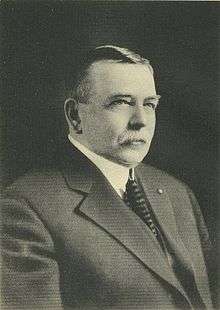Dorr Felt
| Dorr Felt | |
|---|---|
 Dorr E. Felt | |
| Born |
Dorr Eugene Felt March 18, 1862 Beloit, Wisconsin, U.S. |
| Died |
August 7, 1930 (aged 68) Chicago, Illinois, U.S. |
| Occupation | Inventor, businessman |
| Spouse(s) | Agnes McNulty (m. 1891) |
| Children |
Virginia Elizabeth Constance Dorothea |
| Parent(s) |
Eugene Kincaid Felt Elizabeth (Morris) Felt |
| Signature | |
|
| |
Dorr Eugene Felt (1862–1930) was an American inventor and industrialist who was known for having invented the Comptometer,[1] an early computing device, and the Comptograph, the first printing adding machine. The Felt & Tarrant Manufacturing Company that he co-founded with Robert Tarrant on January 25, 1889[2] remained a major player in the calculator industry until the mid-1970s.
Biography
Dorr E. Felt was born in Beloit, Wisconsin[3] where he grew up on the family farm and which he left at age 14 to seek employment. His father, Eugene K. Felt, was a member of the Wisconsin State Assembly.
At 16, "his bent of mind, leaning towards mechanics, led him to seek work in a machine shop in Beloit where he found his first employment in the spring of 1878."[3]
At 18, he started to learn French and eventually spoke it fluently.[4]
In early 1882, at age 20, he came to Chicago and worked as foreman of a rolling mill that had a daily output valued at $2,000.[4]
During the US Thanksgiving holidays of 1884 he decided to build the prototype of a new calculating machine that he had invented. Because of his limited amount of money, he used a macaroni box for the outside box, and skewers, staples and rubber bands for the mechanism inside. It was finished soon after New Year's Day, 1885.[5]
Felt brought his idea to Chicago businessman Robert Tarrant. They signed a partnership contract on November 28, 1887,[2] and incorporated the Felt & Tarrant Manufacturing Company on January 25, 1889. Felt later went on to invent more devices and acquired 46 domestic patents and 25 foreign ones. The original macaroni box prototype and the first Comptograph ever sold are now part of the Smithsonian Museum collection of antique calculators.[6][7]
Felt was awarded the John Scott Medal of The Franklin Institute in 1889.
He was married to Agnes McNulty in 1891 and the couple had four daughters together.
Dorr Felt also was the first ambassador for the Department of Commerce formed to study labor abroad after World War I. He was an excellent photographer, and many of his war-time and post-war time photos were used by the government. Dorr traveled the world and loved learning.
He made his home in Chicago and summered in Laketown Township, Michigan, where the Felt Mansion[8] is registered on the list of National Historic Places.
The Summer Mansion
Dorr was attracted to the pristine beauty of the West Michigan coastline, then known as “the Midwest Riviera,” and in 1919 purchased several hundred acres on Lake Michigan in the rolling dunes between Holland and Saugatuck, naming his estate “Shore Acres Farm.” Felt began construction of the “Big House” in 1925 for his wife, Agnes. This summer home would be large enough to accommodate his married daughters and their families.

Completed in 1928, the 12,000+ square foot mansion consists of 25 rooms, including a third-floor ballroom. Unfortunately, Agnes died in August 1928, six weeks after the family moved in, and Dorr died a year and a half later in 1930. The family kept the home until 1949, but after WWII and the advent of more sophisticated calculators, the family sold the business to Victor Calculator, and the Felt descendants decided to sell Shore Acres Farm. In 1949, they held a large auction, selling off many of the items original to the mansion and grounds. Felt Mansion Website
Dorr E. Felt died of a stroke in Chicago on August 7, 1930. He was 68 years old.
Bibliography
Biographies
- W.W. Johnson, "Scars on My Hands: The Life of Dorr Eugene Felt, Inventor and Industrialist," (unpublished), Schmidt Collection, Mathematics, NMAH.
- Comptometer website
- World of Computer Science
- 1918 Biographical Sketch
- Wisconsin Biographies
References
- ↑ Detroit in its world setting; a 250-year chronology, 1701-1951. Detroit Public Library. 1953. p. 168. Retrieved 2009-12-07.
- 1 2 J. Turk, p. 75 (1921)
- 1 2 Felt and Allied Families, p. 12 (1921)
- 1 2 Papers in Illinois, p.66 (1922)
- ↑ J. Turk, p. 55 (1921)
- ↑ G.C. Chase, p. 223 (1980)
- ↑ J. Turk, p. 119 (1921)
- ↑ The Felt Estate Retrieved 2010-10-03
Sources
Books by Felt
- Felt, Dorr E. (1916). Mechanical arithmetic, or The history of the counting machine. Chicago: Washington Institute.
- Felt, Dorr E.; Holman, Alfred L. (1921). A register of the ancestors of Dorr Eugene Felt and Agnes (McNulty) Felt. Chicago: Priv. print. for D. E. Felt.
Other books
- Turck, J.A.V. (1921). Origin of modern calculating machines. The western society of engineers.
- Meyer, Patricia. The Felt Mansion: A Story of Restoration. Laketown Township, Michigan.
- Chase, G.C. (July 1980). History of Mechanical Computing Machinery. IEEE Annals of the History of Computing, Volume 2, Number 3. Arlington, VA: The American Federation of Information Processing Societies.
- Papers in Illinois history and transactions. Illinois State Historical Society. Springfield. 1922. Retrieved 2009-12-07.
External links
|